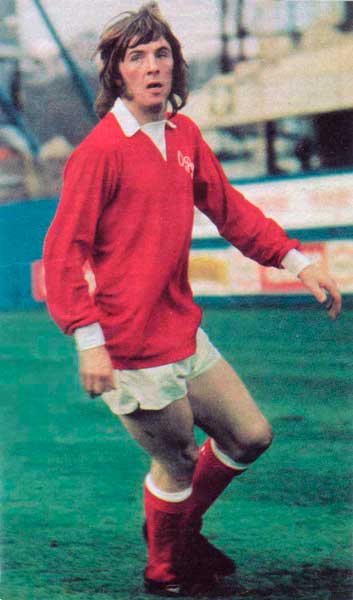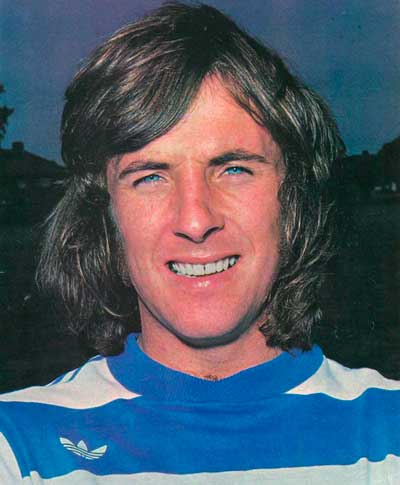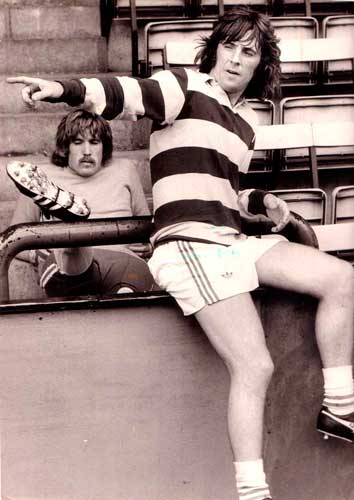This is the final part of an article/interview by Roger Hutchinson, titled: ‘Stan the Man: A Footballer in Limbo’, which first appeared in No.17 (Volume 1) of ‘Street Life’ and was dated June 12 – 23, 1976:
‘Perhaps the absence of Ron Harris from the First Division contributed to Bowles’ consistent excellence last season. More likely, the uncanny accuracy of Don Masson’s passes from midfield gave him more time to think on the ball, and allowed him to spread wider onto the right flank. Bowles was not surprised to read that Masson had played so well for Scotland against Wales and Northern Ireland, although he had not watched either game.
“I always thought he’d be more suited to international football than league football, because he’s got more time in international football. And time is one thing you can’t give Don Masson. If you give him time, he’ll slaughter you…but people who are a bit sharp, who close him down – he’s lost a little bit. Because he’s so slow. He’s so slow it’s unbelievable. My granny could beat him in a race. But he’s so highly skilled that he gets away with it.”
He seems to take over –
“What, taking throw-ins, dead balls, corners, goal-kicks (laughs). He’s like a little Hitler, isn’t he ? That’s what we call him at the club. Adolf.”
Whatever the various contributory reasons, Bowles’ form in 1975 brought an unexpected bonus. Joe Mercer had seen him play earlier in the year, and had recanted on his suggestion that Bowles should never play for England again. Mercer told Revie: “You can’t ignore him. He’s one of the rare ones, and there are so few of those around in the world.” Revie did not pick Bowles for the next important fixture, against Czechoslovakia in the Nations Cup in October ’75.
England lost that game after a pitifully unimaginative performance, leaving themselves only one slim chance of qualifying for the finals of the Nations Cup, a chance that could only be taken if they won resoundingly in Portugal in November. Bowles’ league form was superb during the first half of the ’75/’76 season, and Revie – perhaps in desperation – named him in a squad of 22 players to travel to Portugal.
The press, realising that a scintillating Bowles performance in Lisbon would smear egg over a lot of sports pages hurriedly re-assessed this selfish, lazy, wanton, un-admirable player. He became “Stan the magic man”, whose attitude contrasted now “so sharply with that of Alan Hudson”. He had apparently put his head down and worked, a wiser and more mellow man at 26 years old than at 25.
A week before Bowles and the rest of the England squad were due to travel to Portugal Queen’s Park Rangers played Newcastle United in an evening League Cup match at Loftus Road. In the first-half of that game, Newcastle’s Pat Howard was booked for a tackle that left stud marks on Bowles’ leg, and with five minutes to go Mick Burns crashed into him and Rangers supporters were treated to the familiar sight of the club physiotherapist half-carrying Bowles from the pitch.
He turned out to have incurred a severe groin strain, and was obliged to report as unfit to travel with England. The national side, without Bowles, was lucky to snatch a draw from the Portuguese, and so dropped dismally out of the Nations Cup. Incredibly, however, a fit and back to peak form Stanley Bowles has not, since that November, been named in an England squad.
Baffled, he picks over the things that he’s said and done since then to make Revie change his mind. In January, he posed with a topless model in ‘The Mirror’, and his wife Ann walked out on him, taking the kids back to Manchester. “If he left London and played for another club,” she said, “I think we all could be right again.”
Stanley immediately asked Rangers for a transfer, bur was taken off the list after two weeks during which time the only offer worth considering had been one of ¬£125,000 from Everton. Chairman Jim Gregory wanted ¬£200,000 at least. Bowles for the moment, stayed. He even raked up enough enthusiasm for Rangers’ championship chances to put ¬£400 on them at 16-1.
But he can raise little enthusiasm, any more, for English football as a whole. There are only three teams in the Football League – Derby and Manchester United, as well as QPR – whose style of play he could see accommodating his own, and he has his doubts about Manchester United. His attitude isn’t what the press would describe as sullen, moody, sour grapes. It’s more a frustrated bewilderment that McKenzie and Hudson and Currie and himself seem to be playing a different game to most of the rest of the Football League and that the Football League seem largely to be playing a different game to most of the rest of the world.
Success on this side of the channel is reserved strictly for players like Malcolm Macdonald of whom Bowles says…”He’s fast, and he’s a big strong boy, but if he played on the continent, he’d be third-rate, defences would just nullify him, they’d be too clever for him. Out there, you’ve got to do something unexpected, which he can’t do. Over here, everybody knows what he’s going to do, but he gets away with it simply because he’s so fast.”
And for a man with an expensive gambling habit to support, the fact that English footballers are probably the worst paid major league footballers in Europe, if not the world, hardly encourages him to stay here. Footballers in the 1970’s are not the humble beings that they were supposed to be before the maximum wage was abolished, shy working-class lads grateful to be allowed to play soccer for ¬£10 or ¬£15 a week rather than work down the pit for slightly less. They are glossy, valuable entertainers, and they recognise themselves as such.
They move now, not in the world of the Working Men’s Clubs, but in the world of rock stars and other celebrities…and they see that any other entertainers who were able to draw weekly crowds of 30,000-plus people would be able to name their own terms. And their private lives would have nothing to do with their employers.
Most important of all, footballers on the continent and in America actually have those rights. Compare Franz Beckenbauer’s wages in these, his last days at Munich, with Bobby Moore’s during his swansong at Fulham. Compare Rodney Marsh’s income in Florida with his peak earnings in the English league…and you have Stanley Bowles’ main reason for wanting to play in Germany with SV Hamburg….
RH: They’re talking about paying you ¬£400/¬£500 per week, is that right ?
SB: They’re talking about ¬£300/¬£400 per week, but so much more besides in bonuses and things, it’s ridiculous, it makes our wages – at this club anyway – look pitiful. You see, I reckon I’ve only got about another five years. Unless I’m really in trouble financially, I only want to play until I’m 31, 32…that’s all.
He will go to Hamburg if the German club decides that he’s worth the ¬£200,000 that Jim Gregory is asking. He disarmingly admits that he’s not sure if he could settle there, what with his fear of flying and his wife’s dislike of most places outside Manchester, but he’s prepared to try. There don’t seem to be any reasons left for him to continue playing football in England, to continue putting up with ruined ankles, and crowds calling him queer, and termagant officials who think he’s a cissy in a ‘Man’s Game’.
A list of brilliant, exciting footballers to have played in the Football League over the last decade would not be very long. I mean, the kind of footballers that constantly draw the crowd to its feet, the kind that make with a football that you really didn’t think it was possible to do, the kind that make a game of football a magical event and not just a muddy scuffle.
It would not be a very long list, but it would include George Best, even though he never played what should have been the best years of his career, and now looks like playing out his football life in California. It would include Rodney Marsh, who know seems comfortably settled in Florida. It would include Duncan McKenzie, who at 26 years old, Don Revie described as “a player for the future”, and whose future seems now to be destined for Belgium, slotted comfortably in between Rensenbrink and Van der Elst at Anderlecht.
It would include Charlie George and Alan Hudson, both of whom were nearly, terribly nearly lost to English football. And it would include Stanley Bowles, who may only play in England again if Hamburg are drawn against an English club in a European competition.
It’s not easy to diagnose, this sickness in our game which time and again rejects such players as if they were an allergy. But it would be nice if those men who run English soccer would show some signs of trying to diagnose it, if they would only indicate that they were concerned about the probability that in five or ten years time the Football League will consist of twenty or so full-time teams, made up of hardworking but ordinary players performing before crowds of 10/15,000.
They could start by ceasing to break international law as laid down by the Treaty of Rome, and give footballers what every other worker in Europe regards as a basic right: freedom of contract. That would be nice, it would show a willingness to start treating footballers as human beings with a right to control their own lives, rather than as talented (or not-so-talented) lumps of meat to be confined and controlled, bought, sold, or given away, but never, never consulted.
But even more important than that – because freedom of contract must eventually come, when the clubs take their collective finger out of the dam – let us see some recognition on the part of football’s administrators, from Alan Hardaker and Don Revie through to T.T. Aird, who’s the chairman of Hartlepool, that football’s appeal depends on it being a beautiful game, and that beauty should not be sacrificed for cynical, short-term victories at club or national level.
Let them accept that Alf Ramsey’s success in 1966 may have put the Football League’s attendances up for one season, but that the influence of his victory on our club teams has been responsible as much as anything else for the steady decline in attendances ever since. And let the sporting press…no, they’d probably sue.
Which is just about where we came in…the vile Stanley Bowles was sickening us with his off-field behaviour and making self-pity fashionable. Let’s hope the chairman of SV Hamburg sees through his clever veneer of being just an easy-going lad from Manchester who wants to play football for a living. Let’s all hope so, eh ?’
Stan didn’t go to Germany, but was eventually transferred three years later (December 1979) to Nottingham Forest for ¬£250,000. Thanks for the memories Stan.
Steve Russell



